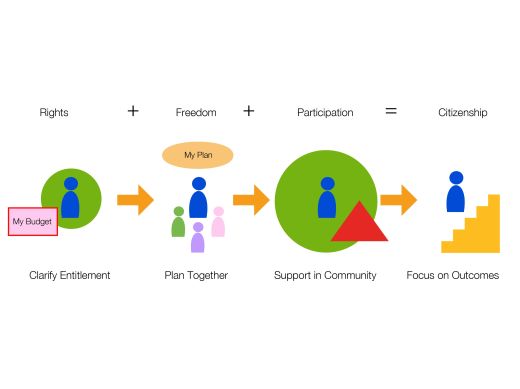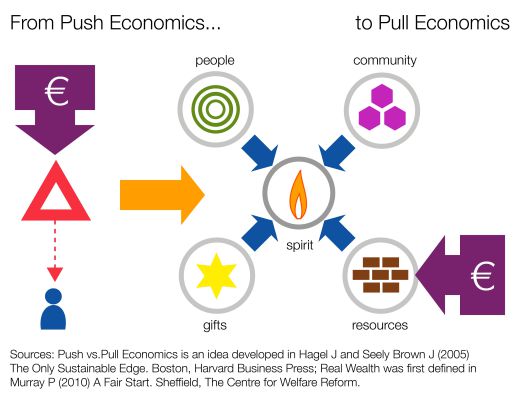Simon Duffy argues that self-directed support is a tool for enhancing our citizenship.
Author: Simon Duffy
This article is the first in a series of three published by Suunta in Finnish here.
This blog was written for friends in Finland.
Self-directed support or personal budgets can offer a great opportunity to people, families and professionals to help people achieve better lives. But much depends on how these systems are designed and what are the underlying values. For it is quite possible to create new systems that sound radical and exciting, but which actually create very little benefit. In fact if you are not careful you can even create systems that make people’s lives worse.
So what are the key things to get right and how can everyone work together to create a system that really does lead to positive change?
Self-directed support has emerged from a long period of thought and advocacy by people with disabilities and their allies. If you do not believe that people have rights or if you think people belong in institutions then self-directed support will not make sense to you. So, the first step is to start with a fundamental commitment to equality of everyone of our right to live our own life with freedom and full participation in the life of the community. Bringing together rights, freedom and participation means creating full citizenship.

Figure 1. The core elements of self-directed support
If we take the goal of citizenship seriously then this will have a number of very practical consequences. To start with I should know that the support I receive is mine as a matter of right - not as charity or as a gift. I am entitled to receive support, I am entitled to know what that support is and to control that support so that it works for me. A rights-based system will have:
The second important dimension to my citizenship is that I am free to exercise my rights. But freedom always relies on the relationships we have with other people. I need to feel encouraged, supported and connected to others. I will certainly not always know the right things to do. Freedom means being able to make wrong decisions. But freedom will only really be possible when the people around me are willing to listen to me and take seriously my desires.
A common danger in the implementation of self-directed support is that the systems tries to replace human relationships with bureaucracy and formal planning processes. But these systems, which often look good on paper, actually tend to reduce freedom and creativity. It is much more important to pay attention to the quality of the relationships that exist around someone.
A few people are naturally confident and able to make their own decisions. But these are a minority. Most of us rely on others to help us think, plan and act. If we have loving families, good friends, peers or other positive allies then we will be able to make progress. If we make mistakes we will change our minds and do something better. It is this social process of exercising our freedom, supported by love and friendship, that drives positive change.
If you are unlucky, if you are alone, have lost your family or are being exploited by others, then the most important thing for professionals to do is to help you find some trustworthy allies to help you build a better life. This is more important than getting the right budget, for most of what we need in life will not come from paid services or from budgets. It is important that social services and social workers remember this and in process of clarifying people’s rights we do not forget our deeper responsibility to each other. A personal budget is just a tool; it is we, people, working together, who use this tool.
The third dimension to our citizenship is how we use our support to help us contribute to the community and to build new relationships. If we can only use our personal budget to pick between a limited number of support providers then the system has largely failed. The key test of a good system of self-directed is that it leads to people being present, active and creative in their communities. This should be our test for success.
Creativity can take many forms, but a useful model of how personal budgets work well is to think of personal budgets as supplements that can be used to stimulate and support the development of a person’s real wealth. Our real wealth are the things we use to build a good and meaningful life: money or exchangeable assets are perhaps the least important forms of our real wealth. More important by far are our relationships with other people, the community we can join and our own personal energy, needs, skills and dreams - all the things that make us unique and which only we can bring into the world.

Figure 2. Self-directed support and real wealth
If we start to think like this then we recognise that self-directed support is simply a way to start things the right way round. Too often, for people with disabilities, society starts with services, placements, institutions. We fund these systems and then we seem to force people into these systems. But people with disabilities are people, they are citizens, they come into the world with gifts. In a good society we all work together to make sure everyone can flourish, everyone’s gifts are shared, everyone has the chance to build a life of meaning.
As Finland begins to develop new systems of self-directed support it is people with disabilities, and families, who will tell you whether you are going in the right direction. And it is important to pay special attention to the people who want to do unusual things, who have crazy dreams or who are angry or disappointed about how things are now. Focus on those who want change and make it easier for them to create the changes they need. Don’t start by focusing on the people who seem perfectly happy with what they get now. This second group will start to make changes too; but they will come later and they will learn from the pioneers, those demanding change now.
Developing self-directed support should feel like a shared adventure, for people, families and professionals. It is not a new administrative system; it is a shared commitment to equality, freedom and active citizenship for all.
The publisher is Citizen Network Research. Self-Directed Support and Citizenship © Simon Duffy 2022.
community, disability, Need for Roots, Self-Directed Support, Finland, Global, Article